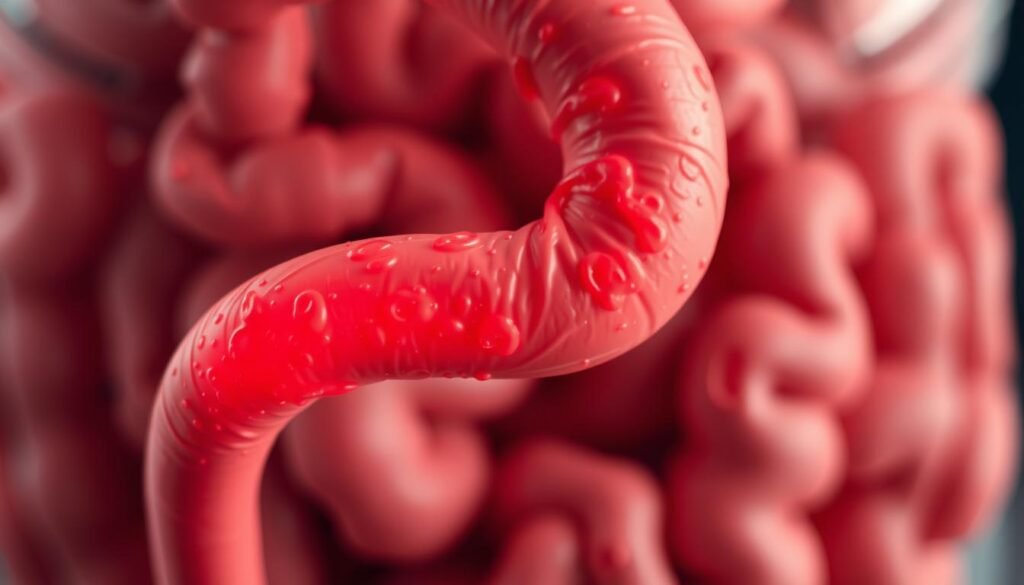Did you know over 60 million American adults suffer heartburn monthly? This issue often leads to more than discomfort. Many individuals struggle with fatigue, which, though not an official symptom of GERD, frequently accompanies the acid reflux symptoms. Symptoms like ongoing heartburn and coughing can drain energy. This greatly affects those dealing with GERD daily.
It’s key to understand how acid reflux causes fatigue. This knowledge shows how physical health and energy levels are connected. People with GERD face the tough mix of bad sleep and constant discomfort. This mix greatly lowers one’s life quality. For ways to fight GERD and its energy-draining effects, check out detailed guides.
Key Takeaways
- Over 60 million adults in the U.S. suffer from monthly heartburn, affecting energy levels.
- Fatigue can arise from the discomfort of GERD, despite it not being classified as a direct symptom.
- Disruptive sleep patterns due to GERD effectively contribute to feelings of exhaustion.
- Managing GERD through lifestyle changes can help alleviate fatigue.
- Understanding the relationship between GERD and fatigue can improve overall well-being.
Understanding Acid Reflux and GERD
Acid reflux is also known as GERD. It happens when stomach acid flows back into the esophagus. This can cause heartburn, throat irritation, and discomfort. A lot of people in the U.S. have GERD. So, understanding what causes it is key to staying healthy.
About 20.7% of acid reflux cases are due to reflux esophagitis. Meanwhile, 18.5% of people have symptomatic GERD. These people often feel more tired than those without symptoms. For example, their scores on the Fatigue Inventory are higher.
The Epworth Sleepiness Scale shows GERD patients are more sleepy during the day. This can make their daily life harder. People with symptoms score around 7.1, while those without score about 5.9.
Lifestyle choices can increase GERD risks. Eating chocolate, coffee, or mint can trigger symptoms. If not treated, GERD can lead to serious issues like esophagitis or Barrett’s esophagus.
Knowing the signs of acid reflux is crucial. If you have ongoing symptoms, changing your lifestyle might help. Learning about silent reflux or LPR can also be useful. It shows how GERD affects not just the stomach but also the throat. More information is available here.
Common Symptoms of Acid Reflux
Acid reflux is also known as gastroesophageal reflux disease (GERD). It comes with various symptoms that can disrupt daily activities. Heartburn is a key symptom, causing a burning feeling in the chest. This happens when stomach acid flows back into the esophagus. Among other GERD symptoms are:
- Regurgitation of food or sour liquid
- Chest pain
- Dysphagia, or difficulty swallowing
- Frequent burping
- Pain when swallowing
- Nausea and occasional vomiting
People with acid reflux symptoms often feel uncomfortable, especially after eating. They may feel like food gets stuck in their throat. Such feelings can make eating stressful. It’s crucial not to ignore these symptoms. Without treatment, GERD can cause serious problems. Examples include esophagitis and Barrett’s esophagus, which raises esophageal cancer risk.
Knowing the signs of GERD can help people make changes to ease symptoms. For tips on managing GERD, visit this resource.
Adjusting your lifestyle can lessen GERD’s unpleasant effects. Avoiding foods high in fat, citrus fruits, and certain drinks is recommended. Avoiding alcohol and coffee can significantly reduce heartburn and other GERD symptoms. Since experiences differ, it’s vital to talk to a doctor for a tailored treatment plan.
How Acid Reflux Contributes to Fatigue
Acid reflux, or GERD, greatly affects daily life, especially in terms of energy. Those with acid reflux face ongoing discomfort. This discomfort drains their energy levels fast. Knowing how GERD symptoms and fatigue are linked shows the struggles of those impacted.
Connection Between GERD Symptoms and Fatigue
GERD causes fatigue because of its physical symptoms. Heartburn, frequent burping, and chest burning are common. These constant symptoms can lead to feeling always tired. This makes it hard for people to focus, get things done, or stay active. They spend much energy managing these ongoing problems.
Impact of Sleep Disturbances on Energy Levels
Sleep issues play a big role in fatigue for acid reflux sufferers. Symptoms like coughing and heartburn interrupt sleep. Poor sleep ruins restful sleep cycles, causing more tiredness during the day. These sleep problems make the body struggle to replenish energy. Treating both GERD and fatigue improves life quality significantly.
The Role of Esophageal Irritation
Esophageal irritation is key in how we feel acid reflux and its symptoms. When the esophagus gets inflamed from too much acid, it hurts and can mess with our sleep. Knowing this helps treat acid reflux better, making us feel good overall.
How Acid Exposure Affects Sleep Quality
Too much acid makes the esophagus sore, causing a loop of discomfort that ruins sleep. GERD sufferers often wake up at night because of heartburn. This makes getting good sleep hard. As a result, many feel tired all day, struggling with daily activities.
Relationship Between Heartburn and Sleep Disruption
Heartburn and sleep issues are closely linked. Heartburn happens when stomach acid goes back into the esophagus, irritating it. This pain can wake people up, leading to poor sleep. Frequent wake-ups mean we’re more likely to be really tired all the time. Treating acid reflux properly can make sleep better, easing that discomfort.

Diagnosis of GERD-related Fatigue
Identifying GERD-related fatigue starts with patient and healthcare professional consultations. Patients talk about their symptoms and medical history. This helps understand the problem. These talks might focus on how *fatigue* links to acid reflux. This conversation is the start of figuring out the acid reflux diagnosis. It paves the way to confirm GERD.
Consultation with Healthcare Professionals
During the consultation, the impact of GERD fatigue on daily life is checked. Healthcare providers consider symptoms like heartburn and sleep issues. They discuss lifestyle and diet. This helps them know how severe the patient’s problems are. It guides them in planning more tests.
Tests and Procedures for Confirmation
To confirm an acid reflux diagnosis, several tests are often needed. These can include:
- Endoscopy: Allows checking the esophagus for inflammation or damage.
- Esophageal pH Monitoring: Measures acid levels to see how often reflux happens.
- Barium Swallow: A special test that shows the esophagus while swallowing a solution.
These tests clarify the GERD situation and its link to fatigue. By getting a full picture, healthcare providers can advise on how to treat both GERD and the fatigue that comes with it.
Managing GERD Symptoms
Lifestyle changes and dietary adjustments are at the heart of managing GERD symptoms. These changes can greatly help in controlling acid reflux. This, in turn, can boost your quality of life.
Lifestyle Changes to Minimize Symptoms
Making certain lifestyle changes is key to coping with GERD symptoms. Here are a few strategies to consider:
- Weight management: Keeping a healthy weight lessens stomach pressure. This can mean fewer acid reflux incidents.
- Quitting smoking: Smoking can lead to more acid and weak esophageal muscles, making GERD worse.
- Stress reduction: Stress can upset your digestive system. Yoga and meditation might help calm you down.
- Regular exercise: Active living improves digestion and overall health. This can help ease GERD symptoms.
- Adequate sleep: Raising the head during sleep can prevent acid reflux at night, leading to better sleep.
Importance of Diet in Managing Acid Reflux
The right diet is key in controlling acid reflux. A smart GERD diet can really help ease symptoms. Here’s what to do:
- Avoiding trigger foods: Foods to avoid include spicy dishes, tomatoes, chocolate, caffeine, and citrus fruits.
- Eating smaller meals: Smaller meals can stop the stomach from getting too full, lowering reflux risks.
- Staying upright after meals: Staying upright for 2-3 hours after eating can also help with digestion.
Adopting these lifestyle changes while sticking to a GERD-friendly diet can make a big difference. It can better manage acid reflux symptoms and lessen fatigue.
| Lifestyle Change | Positive Impact |
|---|---|
| Weight Management | Reduced stomach pressure |
| Quit Smoking | Decreased acid production |
| Regular Exercise | Improved digestion |
| Adequate Sleep | Better sleep quality |

Acid Reflux Treatments and Their Efficacy
Gastroesophageal reflux disease (GERD) is hard on many. It causes heartburn, swallowing problems, and constant cough. There are treatments for acid reflux that help. Knowing how effective they are can help sufferers manage their condition better.
Antacids like Tums and Maalox fix mild symptoms fast by neutralizing stomach acid. Histamine H2 blockers, such as Cimetidine and Ranitidine, reduce acid, offering relief that lasts longer. For serious GERD cases, doctors might suggest Proton pump inhibitors like Esomeprazole and Omeprazole. These meds lower the acid level and help the esophagus heal.
Some people with severe symptoms might need surgery. A procedure called fundoplication can stop the reflux. It strengthens the muscle between the stomach and esophagus.
Making dietary changes is key in controlling acid reflux. Eating foods full of antioxidants, B vitamins, and healthy oils is recommended. Avoiding processed foods is crucial. Drinking plenty of water and exercising regularly helps the digestive system.
Here’s a summary of common acid reflux treatments and how well they work:
| Treatment Type | Examples | Effectiveness |
|---|---|---|
| Antacids | Tums, Maalox | Quick relief from heartburn |
| Histamine H2 Blockers | Cimetidine, Ranitidine | Reduces acid production, longer-lasting effects |
| Proton Pump Inhibitors | Esomeprazole, Omeprazole | Effective for chronic symptoms, promotes healing |
| Surgery | Fundoplication | Might eliminate reflux for severe cases |
Using these treatments, plus changing your lifestyle, can greatly improve life for those with GERD. It’s vital to get care that fits your unique needs. This approach often leads to the best way to control GERD.
Natural Remedies for GERD and Fatigue
People with GERD look for natural ways to lessen their symptoms and the tiredness they bring. Home treatments help, while vitamins and supplements boost health. These methods usually include eating changes and adding certain nutrients.
Home Remedies to Alleviate Symptoms
Trying home remedies for GERD can be very helpful. Here are some good choices:
- Ginger: Ginger tea can calm your stomach and lower swelling.
- Almonds: Almonds’ natural oils can counteract stomach acid and aid digestion.
- Chamomile tea: With its soothing effects, chamomile tea can lessen GERD signs.
- Lemon juice: Mixed with water, lemon juice boosts saliva to fight acid.
- Chewing gum: Chewing gum increases saliva, helping dilute acid in the stomach.
Herbal remedies like marshmallow and slippery elm have helped many. They coat the esophagus, protecting it. This personalized care helps manage home remedies GERD and improves comfort over time.
Vitamins and Supplements That May Help
Certain vitamins and supplements are key for fighting fatigue and aiding digestion. For example:
- Magnesium: It’s calming and helps with tiredness.
- Probiotics: These boost gut health, possibly easing GERD.
- Aloe vera: Aloe vera can calm the lining of the esophagus, reducing acid irritation.
Adding these vitamins for fatigue improves overall health and tackles GERD symptoms. Always talk to a doctor before beginning any new vitamin plan.

| Natural Remedy | Benefits |
|---|---|
| Ginger | Reduces inflammation and soothes the stomach |
| Almonds | Neutralizes stomach acid and aids digestion |
| Chamomile Tea | Calms and reduces GERD symptoms |
| Lemon Juice | Stimulates saliva to neutralize stomach acid |
| Magnesium | Combats fatigue and may regulate stomach acid |
| Probiotics | Promotes gut health and may reduce GERD symptoms |
Embracing these remedies and vitamins offers a full approach to dealing with GERD and its related fatigue. Focusing on both home treatments and proper vitamins aids in achieving improved health.
The Psychological Aspect of Fatigue in GERD Patients
It’s important to understand how fatigue affects GERD patients mentally. People with chronic health issues like GERD often feel anxious and depressed. These feelings can make their fatigue worse and harm their well-being.
Impact of Anxiety and Depression
People with GERD usually feel more anxious and depressed, studies show. A 2019 study found that GERD patients, especially those with chest pain, had high levels of these mental issues. Anxiety might also cause GERD by making the lower esophageal sphincter relax and increasing stomach acid. This bad cycle makes both GERD symptoms and anxiety worse.
Stress Management Techniques
Managing stress is key to dealing with GERD symptoms and mental health. High stress can double the risk of acid reflux. Techniques like mindfulness, breathing exercises, and cognitive behavioral therapy help a lot. They lessen stress’s effect on GERD and fatigue.
- Practicing mindfulness meditation to enhance relaxation
- Engaging in regular physical activity to improve mood
- Establishing a consistent sleep routine to promote restorative rest
- Maintaining a balanced diet rich in essential nutrients to support mental health
Knowing how GERD fatigue and mental health are connected is vital. Understanding the role of anxiety and depression in GERD lets patients manage stress better. This improves their life quality.
Conclusion
It’s key to understand the link between acid reflux fatigue connection for both patients and healthcare experts. Conditions like Gastroesophageal Reflux Disease (GERD) can really make daily life hard. They can also cause a lot of tiredness because of sleep problems and stress.
Dealing with GERD symptoms properly is very important. This helps people keep their energy up and stay well. Strategies include changing your lifestyle, what you eat, and sometimes medical help.
Anxiety and depression play a big role in making people feel tired. This is especially true for those with GERD. So, it’s very important to see how physical and mental health are connected.
If you’re dealing with GERD and feeling tired, you should get help from a professional. They can help you make a plan that fits your needs. By actively managing GERD symptoms, you can get your energy back and enjoy life more.